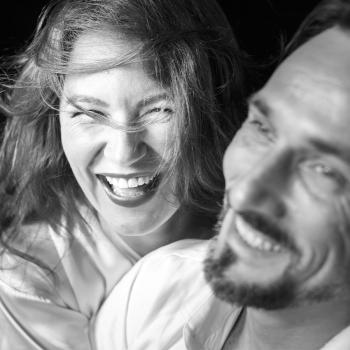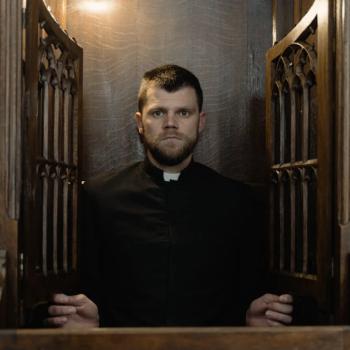The final scene in Dumas, père's Three Musketeers brings young D'Artagnan, the hero, face-to-face with Cardinal Richelieu, a man he judges a usurper of royal authority and (at several degrees' remove) a murderer. Within a few short paragraphs, the cardinal's commanding presence and generosity bring the swashbuckler literally to his knees, from which he swears lifelong fealty.
That scene is far from a perfect analog to the five-second audience I enjoyed last year with the Most Reverend Thomas J. Olmsted, Bishop of Phoenix. To state the obvious, I am not a bonny brawler to match Dumas' Gascon squireen. Olmsted, I am confident, does not dispatch branded floozies to steal diamonds or assassinate foreign dignitaries.
But the parallels are numerous and compelling enough to stick. At the time of our meeting, for reasons we'll consider presently, Olmsted was as infamous among contemporaries as the Red Duke had been. Our brief encounter transformed my share in that disgust into something like a qualified affection. Exactly what that says about the human heart, its fickleness, and the role the common touch plays in tweaking it to the good are questions I leave to the reader.
It was Memorial Day weekend. The parish was holding its annual young adult retreat. Some of us no-longer-young adults had volunteered to man the kitchen while the downy Millennials meditated. For us, the weekend had the feel of a last hurrah, a ball before Waterloo. Within days, our parish, as we knew it, was to vanish. The Dominican friars who had manned the place since 1969 would blow town for good; priests from the diocese would take their places. The mastermind behind the handover was none other than Bishop Olmsted, who intended to use the place to groom candidates for the diocesan priesthood.
I'd spied some seculars about the grounds—casing the joint, it seemed to me—and they looked like members of an alien species. Our friars flew their quirks like regimental colors. One wore black socks with Birkenstocks; another, a serape he might have seized at gunpoint from Henri Nouwen. Their replacements were forbiddingly uniform in clerical black. With their perfectly trimmed hair and modish glasses, the younger ones could have passed for Fox News commentators. Their senior, our pastor-to-be, turned up unexpectedly on our confessional one Saturday and gave me the shock of my life by calling me "Son." Having entered the Church as an adult, I'd never been thus addressed by a priest. For a wild moment, I thought he was speaking Ebonics.
But the headliner was to be the bishop, who had agreed to address the retreatants on the second night, after dinner. PR-wise, His Excellency had seen better days—better years, in fact. Two weeks earlier, Olmsted had made the national news for confirming the excommunication of Sister Margaret McBride. While serving on a hospital's ethics committee, Sister Margaret had signed off on an abortion. Per canon law, the excommunication had been automatic; Olmsted, who had done no more than announce it in a private letter, was essentially an innocent bystander. Even so, pundits framed the story as the Suffering Servant versus the Haughty Hierarch.
I went with it, joined the mob. I confess, I felt only a very distant sympathy for Sister Margaret and the woman whose life she was said to have saved. My interests were, literally, parochial. The bishop was about to ruin my worship experience just to beef up his roster. So if the nation found Sister Margaret's cause more compelling than mine—fine; I'd adopt hers for my own. Before long, I couldn't open my mouth without a National Catholic Reporter editorial coming out.
But at the moment when I first laid eyes on Olmsted, other concerns preoccupied me. The head of the kitchen committee was proving as capable a leader as Captain Queeg. Driven to distraction by the low quality of one helper's snicker doodles, she reduced our three-person crew by a third. For reasons that have never been adequately explained to me, she declined to buy disposable flatware, which made dishwashing feel like a stint in the Magdalen laundries. I was on a break—lying on a picnic table, my shoes and socks off, dragging on a cigarette, marinating in ennui—when His Excellency appeared in the courtyard, a seminarian at either elbow.
Two things struck me about Olmsted's carriage. First, he spared me a glance, which is not what I'd have expected from the sister-bullier described in the papers. Second, when our eyes met, I detected a certain discomfort, as though he had no more desire to catch me in such an undignified state than I had desire to be caught. He might have preferred that I leap to attention, but he wouldn't insist on it. For my part, I've always found nonchalance to be the only reliable antidote for awkwardness. I saluted Olmsted with a dip of my Pall Mall, and he answered with a nod.





